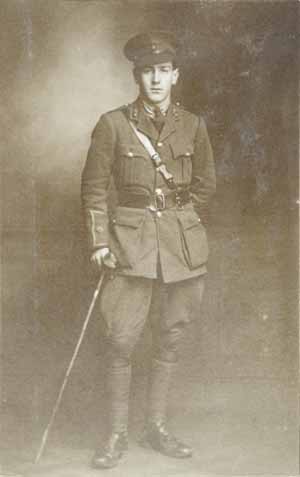Roll of Honour
Captain David Henry George Manley [Jones-Manley]

20 January 1895 – 6 November 1917
Commenced service (following acceptance into College but prior to matriculation) in the O.P.S. Brigade, September 1914. Second Lieutenant, November 1914; Lieutenant, 1916; Captain, 1917. Killed in action at Tel Khuweilfeh on the 6 November 1917.
His Commanding Officer wrote:
I cannot tell you how grieved I am at your loss. We also have lost a true friend and one of the bravest soldiers in the Army
and his Major:
We were working and fighting together on the morning of 6 Nov. He was doing splendid work, better even than he had done before, and more one cannot say. Had he lived he would have assuredly have received a decoration for his gallantry and good work. This is a copy of note or official recommendation sent up to the Commanding Officer, which would have assuredly brought Captain Manley a decoration, and an honourable one, we are told: “Sir, I have the honour to very strongly recommend Captain D. H. G. Manley for the very able way in which he handled the company in the attack this morning (6 Nov.) When the furthest objective was reached, two companies of the 1/6th and two of the Herefords got hopelessly mixed, but were very ably reorganized by him. When we were shelled off the ridge he conducted the withdrawal with marked ability and courage, and personally led several successful counter-attacks: while returning from the last of these he was severely wounded.’ By the measure of our grief and loss, we can faintly guess yours. There is not an officer or man in the battalion who would not have willingly risked his life to have saved him: he died suddenly and painlessly in the perfection of his young manhood, as perhaps he would have wished to die, doing his work, and doing it supremely well to the end.
The Chaplain of his Battalion wrote:
It is just the simple truth to say that he was the most loved man in our battalion, and I think one of the best soldiers in the Army. If the whole truth were known, it would be found that his example in leading his men calmly and courageously in a most murderous place was one of the greatest factors in turning what was the hottest and severest battle fought in Palestine into a most important victory on the flank of the enemy. When burying Captain Manley, one felt it would be better to be with him than left behind. We shall never forget George Manley – the true, sensible, loyal, honourable, lovable man he was.
(‘UK, De Ruvigny’s Roll of Honour, 1914-1924’, p 187, volume 3)
Back to list